| Reviews & Columns |
|
Reviews DVD TV on DVD Blu-ray 4K UHD International DVDs In Theaters Reviews by Studio Video Games Features Collector Series DVDs Easter Egg Database Interviews DVD Talk Radio Feature Articles Columns Anime Talk DVD Savant Horror DVDs The M.O.D. Squad Art House HD Talk Silent DVD
|
DVD Talk Forum |
|
|
| Resources |
|
DVD Price Search Customer Service #'s RCE Info Links |
|
Columns
|
|
|
New York Street Games
A wonderfully nostalgic documentary about a rapidly (and sadly) vanishing element of our shared American culture. New York Street Games, directed by Matt Levy, looks at the games kids used to play in the streets of the five boroughs during the 20th century, while celebrities, politicians, businessmen and average New Yorkers weigh in with their fond memories of what it was like being a kid tear-assing through the concrete jungles of the Big Apple, armed with only a broomstick or a "Spaldeen" or a bottle cap for amusement. On a deeper level, New York Street Games signals a fundamental change in how all American kids play and interact with each other (not just New Yorkers)...and I can tell you: it ain't for the better. How's this for a bonus, though: a spiral-bound booklet is included, outlining the rules for 13 of the most popular games. Now you can train your own little Bowery Boy in the finer arts of "stoopball," "Ringoleavio," and "skully," regardless of where you live!
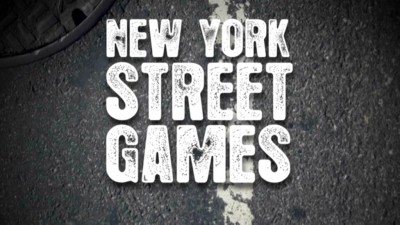
Running about 76 minutes, New York Street Games switches back and forth between archival footage and still photographs, and celebrity interviews, to place the viewer squarely in the yesteryear of New York City streetlife for kids. With narration by actor Hector Elizondo, the documentary first looks at the social conditions of the New York neighborhoods that encouraged kids to play out in the streets (lots of immigrants crammed into buildings, with lots of buildings crammed onto blocks, with the street the only escape for kids looking for fun) before it moves into actually discussing the various games that were played there. People such as Ray Romano, C. Everett Koop, Joe Pantoliano, Arthur Leipzig (who photographed N.Y.C. kids at play during the 1950s), Bob Abrams, Butch Barbella, Vinnie Vella, Keith David, Mike Starr, Annie Lanzilotto, Bobby Costanzo, Curtis Sliwa, Tom Katroscik, Whoopi Goldberg, David Proval, Regis Philbin, Jeff Ackerman, and Patty Guido then pop up throughout the doc, offering their accounts of their favorite games, as well as the lessons they learned in leadership (or appeasement), in problem-solving, in getting along with other cultures, and in unadulterated, joyous play.
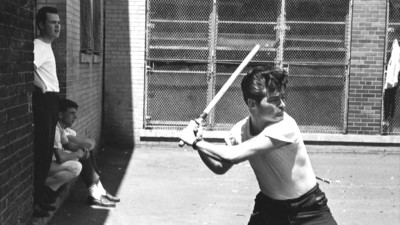
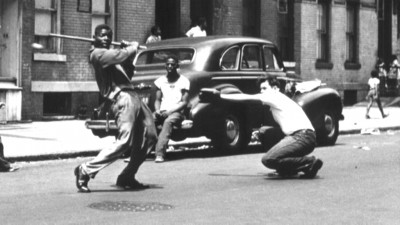
First off, I didn't grow up in New York City...at least not physically. But I saw enough old Bowery Boys movies (along with countless other B-programmers and gangster films and musicals and anything else you can think of set in New York City) to feel like I grew up there. The stereotype of the rough-and-tumble wisecrackin' N.Y.C. street toughs of all those marvelous Warner Bros. and Columbia and other Poverty Row quickies, are as ingrained in my memory as the relatively sedate, hard-working, polite Midwestern kids I actually did grow up with (if you want a close visual equivalent to my childhood neighborhood, think of a Peanuts background: tiny suburban tract homes with lots of fields and woods around). So the specific nature of New York Street Games didn't turn me off; I already knew these kids and their games--at least from the movies.
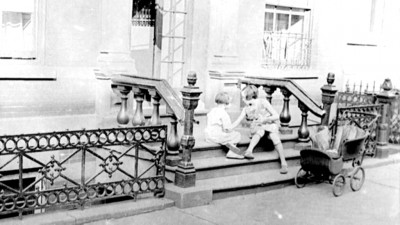
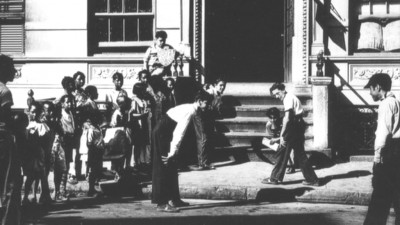
What truly surprised me--although it shouldn't have, when I think about it--was how many of the games described in New York Street Games we played, states away from the Empire State. I'm not talking about "hopscotch" or "kick the can;" everybody experienced those universal games. I'm talking about "punchball" and "boxball" and especially, "I Declare War," which I had somehow totally forgotten over the last 30 years ("I declare war...on the Netherlands!"...and Kaaaa-blam with that tennis ball!). So if you think New York Street Games will be of interest strictly to those who grew up in the five boroughs, think again. Even if none of the games here seem familiar to you, if you're of a "certain age," you'll remember the way we all played back then, which is equally celebrated in this doc. If you were like me, the last thing in the world you wanted to do was stay inside your house after being cooped up in school all day. If you hung around, you'd either have to do homework, or some chore, and TV was off-limits until both of those were done, so the magic box was no escape, either. The minute I hit the kitchen and dumped my books, I was out the back door with a "Hi," and a "Goodbye!" for Mom and I was running, man, and I didn't stop until either the street lights came on or I heard my old man yelling out the front door for me (there was a sound). I played with my friends, or on my own, with anything I could get my hands on, and parents weren't around (why would they want to watch over a bunch of goofy kids? They had work to do). There weren't any "play dates," and what you got up to, you kept it quiet and to yourself, especially if someone came close to killing themselves in the process (have to get downtown? Grab hold of the ladder of the passing freight train. Need a good place to throw rocks? Climb the water tower).

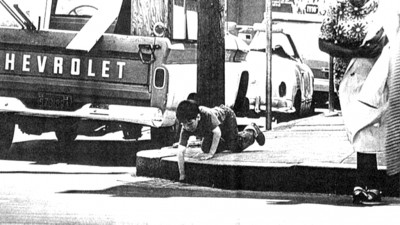
New York Street Games celebrates that unfettered, unsupervised life of play and exploration for kids, and subtly warns about the damage being done to children who no longer seem to enjoy that kind of freedom, whose every minute is micro-managed by hovering, overprotective parents, and sanitized of any risk. Almost to a person, the interviewees in the doc mention with regret that the kids of today don't know how to socialize with each other, especially with groups who may be different from them. They're isolated now within their technology. And in that isolation, they learn nothing about the vital skills of negotiation, fair play, leadership, and triumphing over adversity that all lead to building character. The doc discusses how parents used to trust their neighborhoods and communities enough to let their kids play freely, knowing that matrons or retired men or housewives would keep an eye on things and promptly report back any trouble to the offender's mother or father...with maybe a smack up-side the head for good measure (try that today with somebody else's kid and see what happens. Here's a hint: have bail money handy). Actor Keith David talks humorously about this, as well as kids' own sense of respect for elders back then that's entirely missing today, recounting how he and his friends would apologize even to strangers if they swore in front of them, fearful the news would somehow get back to their parents ("You had to be respectful," he insists).
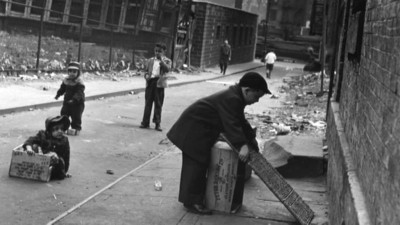
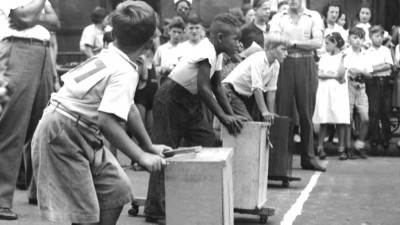
Artist Annie Lanzilotto echoes others when she laments the loss of child-controlled play. Parents weren't involved in how little kids played outside together back then. You went out in the street or playground or empty lot, and you made up the rules, you settled the disputes. Importantly, actor Bobby Costanzo reminds the viewer this system wasn't a democracy, either: the bigger, tougher kids were the law. So you found out what you were made of in dealing with them: you fought, you joked with them, or you ran. And you became yourself through adversity and triumph (in today's zero-tolerance insanity, they arrest elementary children for fighting, so we know how far all of this has devolved). Following through with this theme, Whoopi Goldberg (who I must admit I never liked...but she's been making a hell of a lot of sense these past few years) decries the "nanny state" we live in where even simple games like "tag" are outlawed in schools where "educators" (hee hee) are fearful of someone getting hurt--either physically or, heaven forbid, psychologically. As C. Everett Koop tellingly puts it here, life is nothing more than risk and reward. Everything is a risk, so trying to inoculate children against any and all risks may make us feel like we're doing good...but it may not be the best thing for our children's character.
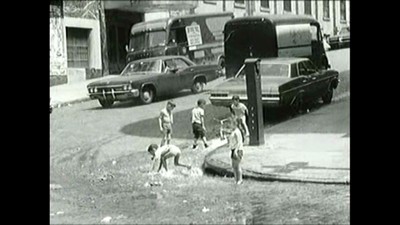
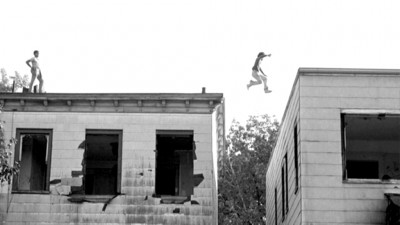
Of course, you don't have to pay attention to any of that, "well, in my day, things were like this..." stuff. You can just watch New York Street Games for the fun of seeing these various games played out and explained. There's a fascinating historical rundown and discussion of the "Spaldeen," which is actually the pink Spalding© High-Bounce Ball®, the ball of choice in New York City for street games (apparently New Yorkers put their own spin on its pronunciation). Watching those kids hoist those skinny broom-bats, aiming for that little Spaldeen, it's amazing anyone hits anything. As for the games themselves, "skully" was particularly interesting, not so much for the play itself, but for the stories about how players personalized their bottle caps and mayonnaise jar lids (Americans will accessorize anything, pal). We used to play "Johnny on the Pony," although we didn't call it that, I'm sure. That's where kids form a bridge of sorts with their bodies, with the head kid leaning against a wall, and then the opposing team jumps on the "pony," trying to break its back (great, rough game). The most fascinating game detailed here has to be "Ringoleavio," though, an epic-sounding variation of "tag" where teams battle to catch each other, throwing caught members in "jail" as individuals try to escape over blocks of streets, climbing up fire escapes and even leaping over rooftops (count me in!). What guy my age out there doesn't want to get involved in a game like that? New York Street Games's subtext may be disturbing--our kids are becoming ineffectual weenies who can't fight, who can't problem-solve, and who can't get off the couch--but if we just follow the doc's simple advice, things may turn out alright in the end. The advice? Koop sums it up best: "Make your kids go out and play."
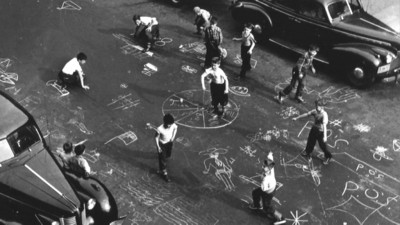
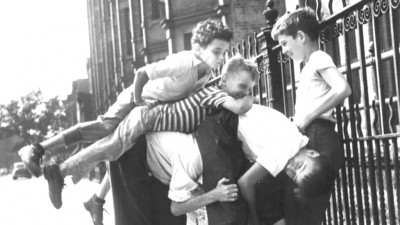
The DVD:
The Video:
The anamorphically enhanced, 1.78:1 widescreen transfer for New York Street Games looks sharp and clear, with average color (sometimes a tad dark), and of course, the usual anomalies associated with transferring archival footage when used. No compression issues.
The Audio:
The Dolby Digital English 5.1 Surround audio mix for New York Street Games is quite healthy, with the sounds of the streets and the kids laughing and playing separately nicely among the speakers. Recording level is strong, and a minimum of hiss. Close-captions or subtitles are not included.
The Extras:
As a super-sweet bonus, a 7 ½" x 5" glossy pamphlet is included, giving detailed game rules for 13 New York street games. Games included are: "stickball," "slapball," "stoopball," "Ringoleavio," "kick the can," "punchball," "hopscotch," "hit the stick," "skully," "boxball," "ace-king-queen," "off the wall," and "box baseball." I took a couple of my younger kids out to the schoolyard and we tried a few...and each one was a winner (they keep bugging me to go back, and I keep telling to go play on their own). The only drawback? That warning to "use caution" when playing street games. Ugh.
Final Thoughts:
Sounding a warning bell at the end of the doc, New York Street Games cautions the viewer that with today's overweight, socially-inept kids plugged into their own little private worlds of XBoxes® and IPads® and non-stop texting smart phones, the hard and wonderful lessons learned out on the streets and playgrounds and empty lots of America--the lessons that build character, build leaders, build survivors--aren't getting learned today. The scrappy, go-getting, always-on-the-move, tough-monkey "American character," if you will, used to be the model of envy and admiration the world over, a character element of the nation that we may be in danger of losing in no small part because our children are coddled and muffled in phony "zero tolerance" assurances, and mollified by "everyone's a winner" games that teach nothing. So says Gramps Mavis, after watching New York Street Games. But we can change that. Unplug the Playstation®, ditch the chips, and kick them out the door for the afternoon. That'll learn 'em. I highly, highly recommend New York Street Games.
Paul Mavis is an internationally published film and television historian, a member of the Online Film Critics Society, and the author of The Espionage Filmography.


|
| Popular Reviews |
| Sponsored Links |
|
|
| Sponsored Links |
|
|
| Release List | Reviews | Shop | Newsletter | Forum | DVD Giveaways | Blu-Ray | Advertise |
|
Copyright 2024 DVDTalk.com All Rights Reserved. Legal Info, Privacy Policy, Terms of Use,
Manage Preferences,
Your Privacy Choices | |||||||













